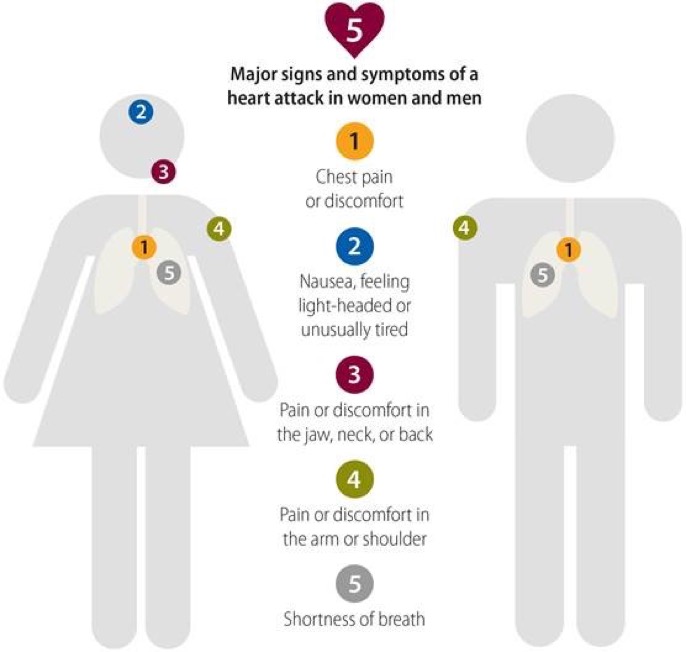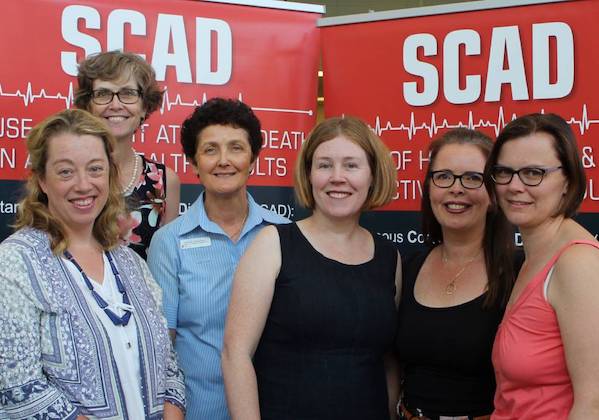Spontaneous Coronary Artery Dissection or SCAD is a heart condition which can affect new mothers and women under 50. It happens when a bruise or tear develops in an artery interrupting blood flow to the heart, but little is known about what causes it. It can happen quickly and without warning.
“I just thought it was something I’d eaten”
Local mum Sharon Kelly did everything she could to avoid going to hospital, despite waking up with chest pains, nausea and vomiting in the middle of the night. Having just given birth to her third son, James, Sharon had been home from hospital for only two days and put the symptoms down to something she’d eaten the night before, she had no idea she had a three cm tear in her artery.
“As far as I was concerned, I wanted to be at home bonding with our new baby, there was no way I was going to hospital. I was feeling calm and relaxed this time around with a newborn; we were in a good place. There was a lot of anxiety associated with his older brother William, as he was born a year after we lost our first son two hours after he was born. There was none of that with James. I wanted to enjoy it. Plus, we had a newborn photoshoot booked that day, and I was adamant I didn’t want to miss it.”

Sharon described how the ambulance arrived under lights and sirens, which she put down to the fact that her husband had described her symptoms in detail. However, she said she was unaware of how grave the situation was: “I still didn’t realise the severity of what was happening. The paramedics hooked me up to an ECG and did some tests, they explained that I really had to go to hospital, and even then, I was so focused on our photoshoot, I reluctantly agreed as long as I could get the tests done quickly.”
“It took some time for it all to sink in”
“The medical staff at Sutherland Hospital were brilliant, but because I have no history of heart disease in my family, there’s none of that ‘heart chatter’ around me, it took some time for it all to sink in. The Dr explained to me that my troponin levels – the enzyme that indicates heart attack has occurred – had tripled, and then when I saw the defibrillator at the foot of the bed, that’s when it slowly dawned on me.”
“I was really freaked out, I was young and healthy – just 41 at the time – all of a sudden I am having chest X-rays and being wheeled onto a cardiac ward with patients much older than me, all I wanted was to go home and be with my baby.”
The SCAD left a tear in Sharon’s artery
“I was told I’d had a SCAD, and was left with a significant tear in my artery, thankfully it could be treated medically, without the need for surgery, but the road to recovery was long, and I was terribly distressed at how I was going to juggle my recovery with being a mum of two children very young children.”
Sharon was sent home from hospital after four days with a strict list of things to avoid during recovery, including no lifting and no walking up hills. She said: “I lived at the top of a hill and my newborn, James was over four kilos, plus my two-year-old William was still asking to be carried from time to time. It was so hard, I think people assume that once you are home from hospital, you are okay, but it took me more than a year to feel truly well again.”
It’s not like the ‘Hollywood heart attack” we see on TV
As a survivor of SCAD Sharon is only too aware of what might’ve happened had her husband not called the ambulance. “Like so many women, I was so focussed on all the things I had to do. I didn’t have time to go to hospital. We see the ‘Hollywood heart attack’ on TV where a person clutches their chest, but there are other more subtle symptoms that indicate a heart episode and it’s important that we make women aware of these so they can act quickly and seek medical attention.”
“Given that SCAD can affect pregnant women and new mums, it’s important that the symptoms are known so that they are not dismissed as the normal things associated with pregnancy and childbirth. I am wholly supportive of the work Sarah is doing through SCAD Research Inc Australia, to get information out there to women.”
SCAD – know the signs

Local mums on a mission
Unfortunately, Sharon is not alone. Sarah from South Caringbah was a fit and healthy mum in her late thirties with two young children when she unexpectedly had a heart attack while playing netball.
“It’s just not something you expect when you’re a fit, healthy mum”
Sarah was shocked to discover that despite the fact that SCAD is the leading cause of heart attacks in pregnant women, new mums and women under 50, very little is known about it. Together with her husband, Sarah founded SCAD Research Inc Australia a charity focussed on raising awareness of the condition through health information packs and campaigning, and generating funds for much-needed research, including a new SCAD study at Victor Chang Cardiac Research Institute in Sydney. To find out more head to www.scadresearch.com.au
What is SCAD?
A tear occurs in one of the heart’s blood vessels. This results in a clot forming in the blood vessel, which expands, causing the artery wall to bulge, thereby blocking or slowing blood flow to the heart, resulting in a heart attack, heart rhythm abnormalities or even sudden death.
Very few men are affected by SCAD, with 70 per cent of cases occurring in women under 50.
Pregnancy is also associated with the condition, with 10 to 15 per cent of SCAD cases occurring within a week of delivering a baby.
Most sufferers are not ‘typical’ heart attack patients but are fit, healthy women who led an active lifestyle and often have no family history of heart disease.
Many women don’t know the signs
When looking at the symptoms of SCAD it isn’t hard to understand why many women, don’t immediately raise the alarm, after all nausea, extreme fatigue, backache, shortness of breath and jaw pain could all be put down to the daily demands of being a mother.
Both Sharon and Sarah hope that by sharing their stories they can help other women to react quickly to the signs. “If you or someone close to you is experiencing one or more of these symptoms, please don’t ignore it.” Urges Sharon Kelly. She continued: “Just call the ambulance and get to hospital quickly. It could save your life!”
